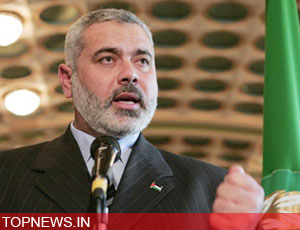Hamas leader calls for unconditional end to Israeli assault
 Gaza - The head of Hamas' government in the Gaza Strip, Ismail Haniya, called for an unconditional end to the five-day old Israeli offensive in the Gaza Strip as the first step toward ending the violence.
Gaza - The head of Hamas' government in the Gaza Strip, Ismail Haniya, called for an unconditional end to the five-day old Israeli offensive in the Gaza Strip as the first step toward ending the violence.
Haniya, who gave a speech while in hiding that was broadcast by the pro-Hamas al-Aqsa television, also demanded and end to the blockade of Gaza, the reopening of crossings, and talks on Palestinian reconciliation.
Haniya and his Hamas lieutenants have gone underground over fears of being being targeted by Israeli warplanes.
Israel launched its massive air campaign on Saturday in response to rocket attacks by Hamas. So far, more about 400 Palestinians have died. Israel has destroyed Hamas security forces buildings, mosques, houses and smuggling tunnels.
"This large scale military aggression and this was on the Palestinian people in the Gaza Strip should immediately stop, without any preconditions," Haniya said.
Haniya's speech came shortly after Palestinian President Mahmoud Abbas gave a televised speech and called on both movements in Gaza, Hamas and Islamic Jihad, to hold dialogue about ending the conflict with Israel. Hamas has accused Abbas of conspiring with Israel to weaken the militant's grip on the enclave.
Haniya praised the strength of Palestinians for standing up to the "crazy Israeli war machines" and denied that Hamas intends to isolate Gaza from the rest of the occupied Palestinian territories.
"When we call for reopening the crossings, including Rafah crossing between Gaza and Egypt, this doesn't mean that Hamas wants to establish an isolated Palestinian entity and separate it from the rest of Palestine," Haniya said.
He urged the Palestinian Authority in the West Bank to free Hamas prisoners, adding "for the sake of 400 martyrs killed in Gaza, free 400 political prisoners in the West Bank."
Haniya meanwhile, denied earlier reports saying that 20 rival Fatah movement prisoners were killed in Gaza central prison on Sunday after Israel bombarded the prisons.
"There are prisoners that we are keeping them in a safe place. They are not political prisoners, they are held for other reasons and they could be freed as soon as we reach a reconciliation after we resume the dialogue," Haniya said. (dpa)